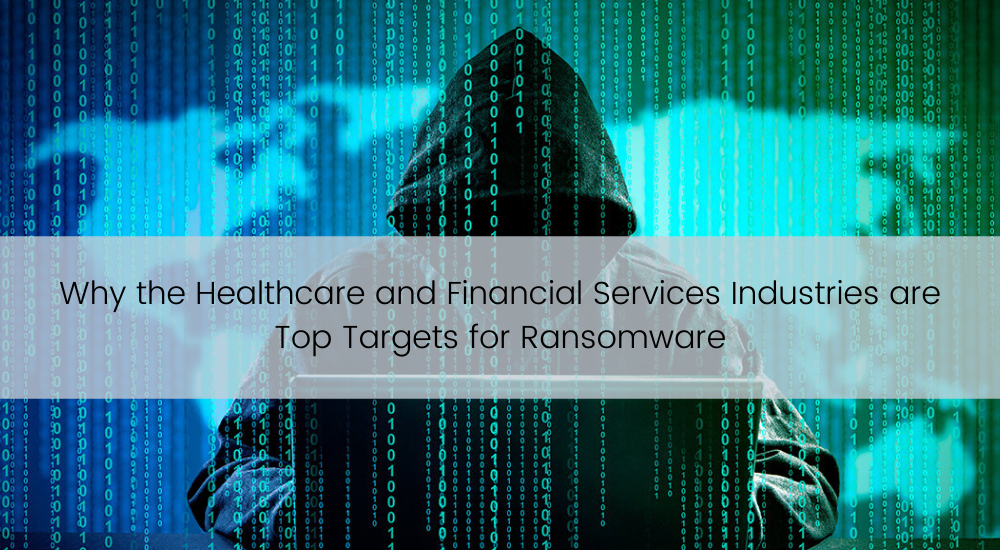
Businesses of all sizes are becoming increasingly vulnerable to ransomware attacks. Whether you’re a group of private practitioners or a local credit union—organizations of all sizes should be protected against cyber criminals.
The New York Times recently reported that ransomware increased by 41% in 2019 compared to 2018. The financial ramifications associated with these cyber attacks can be devastating to businesses and organizations of all sizes. Global ransomware financial damages are projected to hit $20 billion by 2021, up from only $11.5 billion in 2019. Ransomware has become a growing concern for healthcare and financial services firms across the world as hackers infiltrate key systems and withhold access to critical personal information.
How Does Ransomware Work?
Ransomware occurs when unauthorized users infiltrate computer systems. Ransomware can be created by virtually anyone nowadays as attackers have the ability of utilizing off-the-shelf toolkits. Phishing scams are one of the most common methods cyber criminals use to break into systems. Oftentimes, individuals click on untrusted links or seemingly legitimate emails—unknowingly opening the front door and letting attackers in.
Once the infected files bypass systematic barriers—malware can wreak havoc on computer databases by encrypting files and effectively blocking user access. Ransomware can hit immediately or it may slowly spread throughout internal systems. Similar to how a dry cough turns into a contagious case of pneumonia, ransomware has the ability of incubating before launching into a full-fledged attack. As a result malware may be sitting idle for days, weeks, or months until it's too late.
Let’s take a look at the top industries currently being targeted by cyber attackers.
What Industries are at Risk for Cyber Attacks?
The FBI’s Internet Crime Complaint Center (IC3) is receiving 3,000 to 4,000 cybersecurity complaints every day compared to 1,000 a day before the pandemic. The sharp spike will cause companies in all industries to take aggressive action in order to mitigate the risk of cyber attacks. As the number of ransomware attacks continues to rise—organizations of all sizes are becoming targets of security breach and cyber crimes.
Healthcare Industry
The healthcare industry continues to face a growing number of cyber threats. As a business that's rife with sensitive customer information—cyber criminals steal data from medical data systems and resell it on the black market. Medical offices often fall victim to attack due to insufficient security practices and outdated protection software.
Personal health information can be valuable to attackers as it can be worth up to 50 times as much as financial data. Cyber criminals are able to sell patient health records for $60 or more per record—which is substantially higher than traditional credit card information. Due to this, criminals are highly incentivized to target healthcare providers of all sizes.
Hospitals commonly utilize a diverse collection of systems and software. Cybercriminals have the ability of exploiting these existing systematic vulnerabilities to their advantage. Ongoing pandemic concerns have spurred a vast increase in telemedicine and virtual office visits. Healthcare practitioners should take extra precautions to help ensure internal systems remain secure. Here’s some striking healthcare ransomware attack statistics to take note of:
- The Department of Health and Human Services (HHS) Office for Civil Rights reported that healthcare breaches increased by 196% between 2018 and 2019—making it the highest year on record
- Over 41 million patient records were breached in 2019, tripling the number of reported rates in 2018 according to Protenus
- 1,446 hospitals, clinics, and organizations were affected by ransomware attacks have occurred since 2016, costing an estimated $157 million and far more are expected to follow the COVID-19 pandemic
- Cybersecurity Ventures predicts ransomware attacks on hospitals are projected to increase by 5x
Healthcare practices of all sizes may be a victim of attack, but the biggest mistake an organization can make is believing they’re too insignificant to be hit. Cyber criminals may target smaller practices due to the belief that they’re lacking appropriate backups and security mechanisms. The healthcare industry is taking new measures to help minimize the financial ramifications of data breaches as a result of the growing number of attacks.
Financial Services
Financial institutions are increasingly becoming victims of ransomware attacks. Keep in mind that Travelex paid $2.3 million to hackers for the New Year’s Eve ransomware attack, was offline for weeks, and the damage has reverberated globally, forcing the company to prepare for potential collapse. Although institutions are increasingly modernizing their digital infrastructures—transitioning from legacy systems to modern platforms may leave organizations highly susceptible to attacks.
Updating cybersecurity mechanisms is a critical component of protecting financial assets and consumer data. Cyber criminals are consciously aware that financial institutions have the means to pay ransomware debts—therefore they continue to target these companies. 71% of CEOs in the banking sector find that cybersecurity is the biggest threat to stakeholder and customer trust, business prospects, and customer service.
Smaller banks and financial institutions will need third party help to develop strategies, processes, and risk management protocols for cybersecurity. Individuals and organizations must take time to properly educate themselves and plan against potential breaches.
How TBConsulting is Protecting Against Cyberattacks
Ransomware continues to affect organizations of all sizes at a growing rate. In order to safeguard against potential threats—companies must adopt a proactive approach to protecting their business interests. That’s where TBC can develop strategies designed to monitor and protect against future attacks.
TBConsulting provides fully managed solutions that proactively monitor and assess your environment. We’re able to help determine risk, protect data, and develop surveillance security mechanisms.
We help our clients protect their data by providing 24/7 security support. Utilizing a strategic preventative strategy, TBConsulting takes the steps necessary to safeguard businesses from harmful ransomware attacks.
To find out how susceptible your organization is to a cyber attack, check out our free Cybersecurity Diagnostic Report. More companies are being targeted for ransomware, don’t let your organization become a statistic.
.png)

